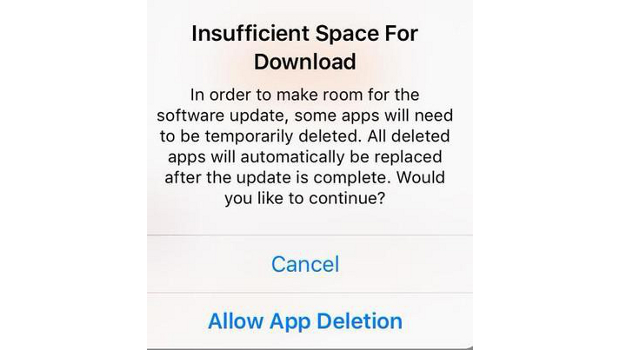Apple’s iOS 9 will ask users if they want to delete apps to make room for the upgrade if their devices are short of space, then automatically select those marked for temporary elimination, according to online reports.
The new feature, revealed yesterday by several users of the iOS 9 preview now in developers’ hands, was another piece in a plan by Apple to avoid repeating the debacle of last year, when owners of iPhones and iPads with small storage allotments were unable to easily install iOS 8. Some had to laboriously remove apps or purge photo and music collections to free up enough room for iOS 8.
Earlier this month, Apple said that it had reduced the amount of free space required to install iOS 9, from the 4.6Gb for last year’s upgrade to 1.8Gb this fall, when the new operating system releases.
Apple has also debuted a multi-part technology dubbed App Thinning, essentially a way for third-party developers to optimise app installation delivery and processing for the storage space on the destination device. An iPhone with just 16Gb of space, for instance, would be treated differently than one with 128Gb.
The app deletion option was noticed by several users of the iOS 9 preview, including 16-year-old iOS developer Kaleb Butt of Vancouver, who tweeted a screenshot of the deletion notification.
“Insufficient Space for Download,” the pop-up stated. “In order to make room for the software update, some apps will need to be temporarily deleted. All deleted apps will automatically be replaced after the update is complete.”
Apple issued a second iOS 9 beta on Tuesday, as well as a second preview of OS X 10.11, aka El Capitan.
Decompressed
Typically, OS upgrades require more space to install than they eventually occupy, thanks to their need to unpack compressed files – much too large to hold in memory – before beginning the process. Upgrades also create large temporary files, also written to storage, that contain copies of the individual components of the to-be-upgraded OS. That ensures a working device if the upgrade fails for some reason, as the originals can then be put back into place as part of a roll-back.
After a successful upgrade, the temporary files are automatically deleted, freeing up space.
It was unclear from Butt’s tweet, and numerous follow-ups by others, how Apple chooses the apps to delete and later reinstall, whether it takes a hands-off approach to apps that store data locally, and if not, what happens to the data.
Some of the retweets and replies to Butt’s tweet wondered why Apple went to such lengths when it should, in their opinion, simply stop selling devices with smaller amounts of storage. “Such tricks would not be needed if base iPhones were 32Gb,” tweeted Herid Fan.
That, however, would go against Apple’s grain and sales model: Historically, the company starts all its device lines at a smaller storage allotment, then prices models with more space higher in the expectation that most users will opt to pay a bit more to get more.
Apple has not said exactly when it will release iOS 9, admitting only that it would be this autumn. The last three years, Apple delivered a new iOS on the Wednesday nearest the middle of September. If it followed that schedule this year, Apple would release iOS 9 on 16 September.
Computerworld







Subscribers 0
Fans 0
Followers 0
Followers